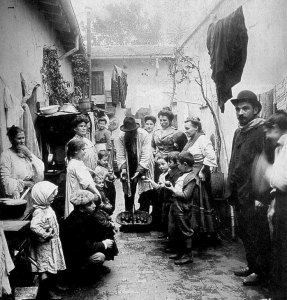The Lunfardo dialect of Spanish arose in the last quarter of the 19th century among petty criminals living with immigrants and native Argentines in the conventillos – sheet metal tenements – of lower-class neighborhoods in Buenos Aires. Because so many of these immigrants (some ten million between 1821 and 1932) were poorly educated or illiterate Italians speaking their regional dialects, and because of the pressing need to communicate with their Spanish-speaking neighbors and associates, a fluid and linguistically unstable macaronic language called Cocoliche was formed among these first-generation, mostly rural, immigrants, and it is this imperfect form of Italian-flavored Spanish that is the direct cause of most of the non-Spanish words as well as of other lexical changes such as suffixes found in Lunfardo. The very word “Lunfardo” itself is, in fact, an Italianism derived from the word lombardo (someone from Lombardy) in various Italian dialects.
Today, Lunfardo is no longer associated with petty criminality and the lower social classes, and its Italianisms have earned their own place as part of the dialect, elements of which have spread to other Latin American countries such as Uruguay and Chile.
Following is a sampling of some lexical Italianisms in Lunfardo.
chitrulo (from citrullo) – the original citrullo means “stupid” or “silly” in several southern Italian dialects and derives from cetriolo, which means “cucumber”
atenti (from attento or attenti) – interjection meaning “to take care”
encanar (from incaenar) – the Italian word means “to chain”, leading to its meaning of “arrest”, “detain” or “incarcerate” in Lunfardo.
furcazo (from forca or fùrca) – This word describes a technique for beating someone up with a blow to the back, the right knee on the kidneys and an elbow holding the neck under the chin, which is its connection to the original words’ meaning (gallows).
morfar (from morfa or morfilar) – The original word means “eat”, and still does so in Lunfardo, although it has expanded to include “to rape”, “to suffer” and “to kill”.
parlar (from parlare) – Unlike standard Spanish, where this word means “to chatter”, parlar retains the original Italian meaning of simply “to talk”.
posta (from Latin appositus to Italian posta) – The original Latin meant “appointed” or “assigned”, which gave rise to the Italian posta (“a place to stay”, “the place for a horse in a stable” and, finally, “set of horses for mail and transport service”). This was adopted into Spanish with the meaning “a soldier standing guard”, which generalized into “to be somewhere on purpose”, which led to the form “aposta”, meaning “on purpose”. It is unknown whether the Lunfardo word derives from the Italian or the Spanish, but it originally meant “comprehensive” or “precise”, from which its current meanings of “good”, “excellent” or “beautiful” arose.
We’ll continue with more Italianisms in Lunfardo next week!




